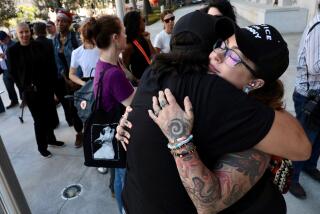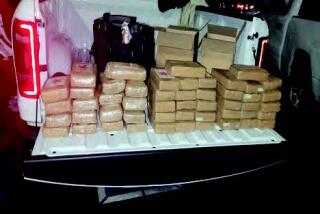Jury Acquits 2 Men in Money-Laundering Case : Trial: Prosecutors alleged that cash from cocaine sales was handled by a ring based in the L.A. jewelry district. Deliberations on seven other defendants continue.
A federal court jury Tuesday acquitted two men of conspiracy and money-laundering charges in a case involving âOperation Polar Cap,â a lengthy investigation centered in the downtown Los Angeles jewelry district.
After a seven-month trial and eight days of deliberations, the jurors found Peniamin Mahseredjian , 37, of La Crescenta not guilty on all 27 counts lodged against him in a 1989 indictment. The panel also acquitted Krikor Chahinian , 43, of Tujunga of all 24 counts against him.
âHe is totally vindicated,â said Mahseredjianâs attorney, Theodore Flier.
âIâm very happy for my client. Heâll be able to spend Christmas with his family,â said Anna Ho, court-appointed lawyer for Chahinian, who was arrested in a massive sweep in February, 1989, only a few months after he had immigrated from Lebanon. He had been held without bail since then. U.S. District Judge William D. Keller ordered Chahinianâs immediate release.
Mahseredjian owns A & P Jewelers in a building at 225 W. 5th St., where the laundering ring allegedly was centered. Federal prosecutors had alleged that Mahseredjian received 26 shipments of drug money, totaling $8.3 million, in June, 1988, and turned the money over to his brothers-in-law, Nazareth and Vahe Andonian, two of the main defendants in the case.
The government alleges that the nine defendants illegally laundered $350 million in drug money, making it one of the largest such federal cases ever filed.
Flier said Mahseredjian, a native of Syria, merely agreed to accept packages from Loomis Armored Transport Co. for the Andonians at times when they were not in their offices in the same building.
âHe had no guilty knowledge of any laundering or intent to launder or traffic in narcotics,â the attorney said, calling his clientâs indictment âa government overreach.â
âI believe that they charged me just because I am the brother-in-law of the Andonians,â Mahseredjian said. âI was very angry because I believe the United States is a fair country.â
Mahseredjian was arrested when federal agents swept through the jewelry district and government officials announced that they had broken up an international scheme to launder the profits of cocaine sales.
The jeweler spent 17 days in jail before he was freed on $100,000 bail. At the time, Mahseredjian said, about $200,000 of gold chains--his business inventory--were seized. The goods will be returned to him because of the acquittal, Flier said.
Mahseredjian said he will return to work as a wholesale jeweler today. He said his wife kept the business running during the trial.
Chahinian was working as a $500-a-week messenger for the Andonian brothers when he was arrested, Ho said.
âThe allegations were that he picked up money from different jewelers and delivered money to the bank,â the lawyer said. âHe was a mere messenger. He had no guilty knowledge. He does not speak English.â
âIt wasnât right to keep him in custody 22 months,â the attorney said. âThe verdict restores my faith in the system.â
Assistant U.S. Atty. Jean Kawahara, one of the prosecutors, declined comment on the verdicts.
The jury resumed deliberations on the remaining seven defendants.
Documents filed in U.S. District Court in Los Angeles contend that members of the jewelry district ring collected cartons of money packed like bricks and shipped by armored car from contacts in Houston, New York City and Los Angeles.
After the money was counted in Los Angeles, government officials said, it was wired to contacts in Montevideo, Uruguay, and Panama City, Panama, and used to export cocaine to the United States. More than 640 pounds of cocaine was seized in the 1989 raids.
The government has alleged that Raul Vivas, a Buenos Aires gold dealer, orchestrated the money-laundering scheme from a currency exchange called Cambo Italia in Montevideo.
During the trial, Kawahara said the company âwas the perfect front for money moving to South America under the guise of precious metals and gold sales.â
Vivas was arrested last year and extradited to the United States. Last week, the jury announced that it had found him guilty of conspiracy but said that it was still deliberating 26 other counts against him.
The other defendants are Juan Carlos Seresi, Ruben Saini, Joyce Momdjian and Zepur Moroyan.
As a result of the investigation, trial is pending for 12 other men charged with laundering $312 million through Ropex Corp., another downtown jewelry company at 550 S. Hill St. Also, several individuals arrested in the 1989 raids pleaded guilty to money laundering and cooperated with federal investigators.
More to Read
Sign up for Essential California
The most important California stories and recommendations in your inbox every morning.
You may occasionally receive promotional content from the Los Angeles Times.










